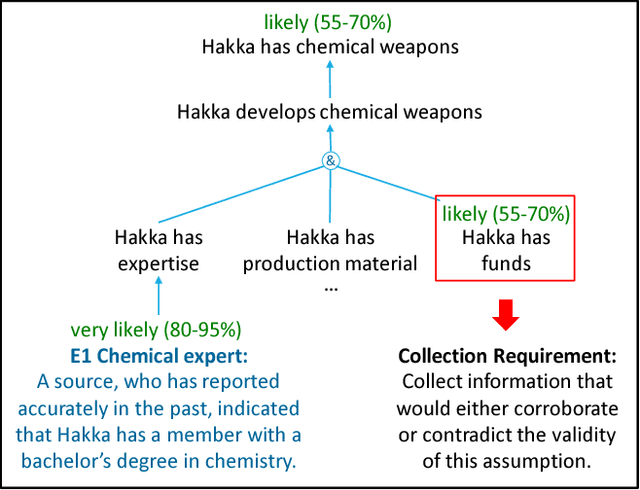Mihai Boicu
AAAI FSS-21: Artificial Intelligence in Government and Public Sector Proceedings
Dec 10, 2021Abstract:Proceedings of the AAAI Fall Symposium on Artificial Intelligence in Government and Public Sector, Washington, DC, USA, November 4-6, 2021
Shared Model of Sense-making for Human-Machine Collaboration
Nov 05, 2021



Abstract:We present a model of sense-making that greatly facilitates the collaboration between an intelligent analyst and a knowledge-based agent. It is a general model grounded in the science of evidence and the scientific method of hypothesis generation and testing, where sense-making hypotheses that explain an observation are generated, relevant evidence is then discovered, and the hypotheses are tested based on the discovered evidence. We illustrate how the model enables an analyst to directly instruct the agent to understand situations involving the possible production of weapons (e.g., chemical warfare agents) and how the agent becomes increasingly more competent in understanding other situations from that domain (e.g., possible production of centrifuge-enriched uranium or of stealth fighter aircraft).
Toward a Computational Theory of Evidence-Based Reasoning for Instructable Cognitive Agents
Oct 09, 2019



Abstract:Evidence-based reasoning is at the core of many problem-solving and decision-making tasks in a wide variety of domains. Generalizing from the research and development of cognitive agents in several such domains, this paper presents progress toward a computational theory for the development of instructable cognitive agents for evidence-based reasoning tasks. The paper also illustrates the application of this theory to the development of four prototype cognitive agents in domains that are critical to the government and the public sector. Two agents function as cognitive assistants, one in intelligence analysis, and the other in science education. The other two agents operate autonomously, one in cybersecurity and the other in intelligence, surveillance, and reconnaissance. The paper concludes with the directions of future research on the proposed computational theory.
AAAI FSS-18: Artificial Intelligence in Government and Public Sector Proceedings
Oct 14, 2018Abstract:Proceedings of the AAAI Fall Symposium on Artificial Intelligence in Government and Public Sector, Arlington, Virginia, USA, October 18-20, 2018
Co-Arg: Cogent Argumentation with Crowd Elicitation
Oct 02, 2018



Abstract:This paper presents Co-Arg, a new type of cognitive assistant to an intelligence analyst that enables the synergistic integration of analyst imagination and expertise, computer knowledge and critical reasoning, and crowd wisdom, to draw defensible and persuasive conclusions from masses of evidence of all types, in a world that is changing all the time. Co-Arg's goal is to improve the quality of the analytic results and enhance their understandability for both experts and novices. The performed analysis is based on a sound and transparent argumentation that links evidence to conclusions in a way that shows very clearly how the conclusions have been reached, what evidence was used and how, what is not known, and what assumptions have been made. The analytic results are presented in a report describes the analytic conclusion and its probability, the main favoring and disfavoring arguments, the justification of the key judgments and assumptions, and the missing information that might increase the accuracy of the solution.
 Add to Chrome
Add to Chrome Add to Firefox
Add to Firefox Add to Edge
Add to Edge